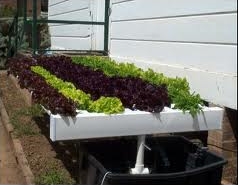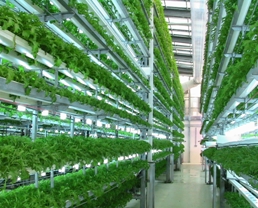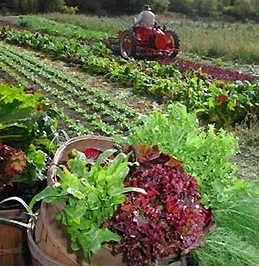Hydroponics and Organic Farming
Climate change stories in the media in recent years have encouraged many people to rethink the traditional ways of farming, especially as the pressure to produce more food at a high quality and low price for a growing global population has in some extreme cases resulted in environmentally disastrous consequences.
So what about hydroponics and organic farming? Are they related and are they potential mainstream production systems for the future?
In short, like many other sustainable farming and land management practices,hydroponics and organic farminginvolve working smarter rather than harder and having a clear understanding of the inter relationships between the inputs and outputs in any system.
HYDROPONICS
Wikipedia provide the following overview - Hydroponics (From the Greek hydro, water, and ponos, labor) is a method of growing plants using mineral nutrient solutions, in water, without soil. Terrestrial plants may be grown with their roots in the mineral nutrient solution only or in an inert medium, such as perlite, gravel, mineral wool, or coconut husk.
When the required mineral nutrients are introduced into a plant's water supply artificially, soil is no longer required for the plant to thrive.
Almost any terrestrial plant will grow with hydroponics.

The environment in a hydroponics greenhouse can be tightly controlled providing soil-less/controlled-environment agriculture (CEA). Supporters claim that with this growers can make ultra-premium foods anywhere in the world, regardless of temperature and growing seasons. Growers monitor the temperature, humidity, and pH level constantly.
Advantages
Some of the reasons why hydroponics is being adapted around the world for food production:
- No soil is needed
- The water stays in the system and can be reused - thus, lower water costs. Hydroponics also saves water; it uses as little as 1⁄10• 1⁄20 the amount as a regular farm to produce the same amount of food.
- It is possible to control the nutrition levels in their entirety - thus, lower nutrition costs
- No nutrition pollution is released into the environment because of the controlled system
- Stable and high yields in a small area
- Can be used in places where in-ground agriculture or gardening is not possible
- Pest and disease control are easier than in soil
- In conjunction with controlled environmental conditions (especially light intensity, photoperiod (day/night), temperature and relative humidity) crops can be harvested outside of their ™normalî season

As an example of production - In a 10,000 square foot greenhouse, you can grow about 4,000 - 5,000 pounds of tomatoes every week. That£s very good! Lettuce growers are picking mature heads of lettuce in under 4 weeks, and with say, 20,000 square feet of growing space, can produce nearly 3,000 heads of lettuce per week.
Disadvantages
- The hydroponic conditions (presence of fertilizer and high humidity) create an environment that stimulates salmonella growth.
- Pathogen attacks such as damp-off due to Verticillium spp. wilt caused by the high moisture levels associated with hydroponics and overwatering of soil based plants.
ORGANIC FARMING
Wikipedia advises that - Organic farming is a form of agriculture that relies on techniques such as crop rotation, green manure, compost and biological pest control to maintain soil productivity and control pests on a farm. Organic farming excludes or strictly limits the use of manufactured fertilizers, pesticides (which include herbicides, insecticides and fungicides), plant growth regulators such as hormones, livestock antibiotics, food additives, and genetically modified organisms.

Organic agricultural methods are internationally regulated and legally enforced by many nations, based in large part on the standards set by the International Federation of Organic Agriculture Movements (IFOAM), an international umbrella organization for organic farming organizations established in 1972. IFOAM defines the overarching goal of organic farming as:
"Organic agriculture is a production system that sustains the health of soils, ecosystems and people. It relies on ecological processes, biodiversity and cycles adapted to local conditions, rather than the use of inputs with adverse effects. Organic agriculture combines tradition, innovation and science to benefit the shared environment and promote fair relationships and a good quality of life for all involved."
In the USA, organic food is produced by farmers who emphasize the use of renewable resources and the conservation of soil and water to enhance environmental quality for future generations.
Other aspects include:
- Products come from animals that are given no antibiotics or growth hormones.
- Organic food is produced without using most conventional pesticides; fertilizers made with synthetic ingredients or sewage sludge; bioengineering; or ionizing radiation.
- Before a product can be labeled ëorganic,£ a Government-approved certifier inspects the farm where the food is grown to make sure the farmer is following all the rules necessary to meet USDA organic standards.
- Companies that handle or process organic food before it gets to your local supermarket or restaurant must be certified, too.
More information from: http://www.ams.usda.gov/nop/Consumers/brochure.html

Somestates in the USA require soil as an essential to obtain organic certification. There are also overlapping and somewhat contradictory rules established by the US Federal Government, so some food grown with hydroponics can be certified organic.
In Australia, there is no clear legislated definition of "organic". The issue of numerous standards was made clear by an Australian Federal Court decision in August 2007 where the Hon. Justice Gray acknowledged the absence of any recognized legal definition of the term 'organic' and the difficulty this presented in creating an enforceable injunction in broader terms to prevent misrepresentation of eggs as 'organic'.
Organic Farming has been successfully adopted by poorer marginalized farmers • it does not require high tech high start up costs.
Some examples:
223,000 farmers in southern Brazil using green manures and cover crops of legumes and livestock integration have doubled yields of maize and wheat to 4-5 tons/ha.
45,000 farmers in Guatemala and Honduras used regenerative technologies to triple maize yields to 2-2.5 tons/ha and diversify their upland farms, which has led to local economic growth that has in turn encouraged re-migration back from the cities.
Advantages
- A sustainable balance between the inputs and outputs necessary for local food independence
- Increased nutritional components in food compared to other traditional techniques, with good or better yields than traditional systems.
- Low input costs as there is no need to buy expensive imported fertilisers, herbicides and pesticides. The increase in yields also come with lower production costs allowing a greater profit.
- In less developed rural areas, the substitution of more labor-intensive activities such as cultural weeding, composting and intercropping for expensive imported chemical inputs, provides more employment for the local and regional communities. This employment allows landless laborers to pay for their food and other needs.
Disadvantages
- Lack of volume makes pricing higher than traditional large enterprise systems and produces some consumer resistance.
- Lack of product consistency in appearance with many organic growers not producing at the levels that are achievable.
- Lack of efficient certification and varying standards make uptake by smaller farmers difficult. A co-operative approach with farmers grouping together in one community would help to overcome this obstacle.
- More technical advice to help new entrants would encourage a more rapid and competent uptake.

Last updated: 0000-00-00 00:00:00

